
Forthcoming 2 April 2014 Available for Pre-Order Now
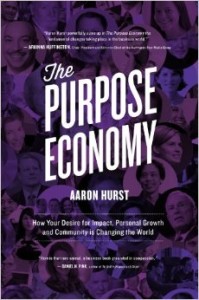
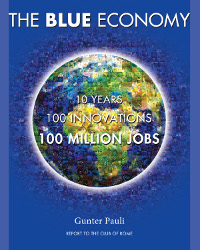
by GUNTER PAULI author of the Report to the Club of Rome
Blue Economy is ZERI’s philosophy in action.
Blue Economy is where the best for health and the environment is cheapest and the necessities for life are free thanks to a local system of production and consumption that works with what you have.
“Innovative business models“ are capable of bringing competitive products and services to the market responding to basic needs while building social capital and enhance mindful living in harmony with nature's evolutionary path.
“Competitiveness”is harnessing and optimizing the innate virtues and values connecting untapped local potential – like a natural system, where the seeds lie fallow only to sprout with amazing vigor at the first rain unleashing joy and happiness as the conditions for mind full-living are met in balance and in harmony.
Continue reading “Worth a Look: The Blue Economy by Gunter Pauli”
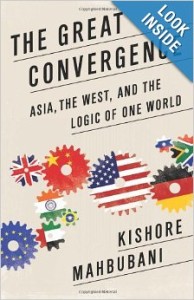
The twenty-first century has seen a rise in the global middle class that brings an unprecedented convergence of interests and perceptions, cultures and values. Kishore Mahbubani is optimistic. We are creating a new global civilization. Eighty-eight percent of the world's population outside the West is rising to Western living standards, and sharing Western aspirations. Yet Mahbubani, one of the most perceptive global commentators, also warns that a new global order needs new policies and attitudes.
Policymakers all over the world must change their preconceptions and accept that we live in one world. National interests must be balanced with global interests. Power must be shared. The U.S. and Europe must cede some power. China and India, Africa and the Islamic world must be integrated. Mahbubani urges that only through these actions can we create a world that converges benignly. This timely book explains how to move forward and confront many pressing global challenges.
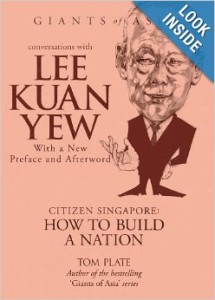
Political genius is never without controversy, or without mystery. This is what makes it so interesting and so rare. Is Lee Kuan Yew the feral, authoritarian figure that Western critics claim? Or a stoic pioneer in new approaches to developing a nation—uncorrupt, modern, almost scientific?American journalist Tom Plate first interviewed the founder of modern Singapore in 1996 in a continuing back-and-forth with LKY that led to the summer of 2009, when the former prime minister agreed to sit down for two days of unprecedentedly informal but intense conversations that led to this special book. This new edition includes fascinating excerpts from prior interviews, as well as the author’s assessment of the man who goes down in history as the world’s longest-serving prime minister—and as one of the most unforgettable political figures of modern times.
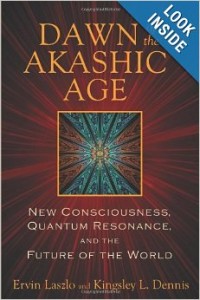
Ervin Laszlo and Kingsley L. Dennis et al.
4.0 out of 5 stars Superb Appetizer Book — a Potpourri of Genius — Not the Main Plate, December 26, 2013
Buy and read this book for a marvelous panoramic view of the latest thinking circling around the end of the top-down scarcity model that concentrates wealth, and the emergence — sooner than most might expect — of the distributed bottom-up local to global harmonization.
This is a hybrid book — the first two thirds are written by the co-authors (Laszlo and Dennis), while the last third is a collection of eleven very short essays, each generally provocative and each providing me with at least one insight, web site, or book that I was not aware of. The book ends with recommended readings in the following categories that are a also a summary of what the book strives to cover at a very high level:
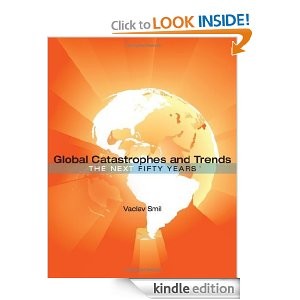
Vaclav Smil
![]() Very balanced and insightful thinking on the topic, September 3, 2010
Very balanced and insightful thinking on the topic, September 3, 2010
Contrary to what the title suggests, this is not about over-hyping any apocalyptic scenarios. To the contrary, Smil thinks through issues in an insightful and detached way. From the book, you develop critical thinking skills to vaccinate your mind against Media hype. You also develop a healthy skepticism towards any forecasts as they always miss the boat.
Smil classifies changes that could affect our civilization into two categories. First, the abrupt ones are unpredictable and potentially devastating. They include natural phenomena such as asteroids, volcanic eruptions, tsunamis, floods, earthquakes, and influenza pandemics. They also include man-caused wars, genocides, and terrorism. The second type of changes occur over half a century or more. Those include the energy transition away from fossil fuel, and the slow changes in balance of geopolitical powers.
Smil states we are notoriously bad at forecasting risks or anything else. He mentions numerous Peak Oil forecasts that were invariably wrong. Smil mentions how in the 1970s, we were concerned a next ice age was upon us. Geopolitic, economic, and demographic forecasts have been wrong too. The rapid economic ascent of China and rapid retreat of Japan since 1990 were unforeseen by everyone. The sudden break up of the USSR was also unexpected.
Smil states we are even bad at explaining what already happened. As an example, Diamond in his book Collapse: How Societies Choose to Fail or Succeed mentioned only deforestation as a cause of the devastation of the Easter Island community. But, he missed out on rats infestation, infectious diseases, and enslavement. We invariably miss out on tons of variables when explaining past events.
Continue reading “Review (Guest): Global Catastrophes and Trends – The Next Fifty Years”
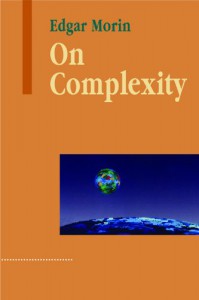
Edgar Morin
7 Stars Life Transformative Foundation Work for Everything Else
This is a remarkably coherent book about the most important topic for all of us, the matter of complexity and more to the point, thinking about complexity. I certainly recommend it most strongly, along with two other books by the same author that I have reviewed:
Homeland Earth : A Manifesto for the New Millennium (Advances in Systems Theory, Complexity and the Human Sciences)
Seven Complex Lessons in Education for the Future (Education on the Move)
The Foreword by Alfonso Montuori is easily the equal of the main body by Edgar Morin, and I am totally awed by the mastery demonstrated in Montuori's synthesis and framing of Morin's work. I venture to say that I would not have gotten as much from the main body without the structure of the Foreword.
Montuori, always drawing on Morin, emphasizes a number of core concepts that I note down:
01 We must abandon the architectural or machine metaphor that assumes a foundation or base for what is actually a complex complete whole that can be viewed from any point.
– – – – –
My last comment first: this book ends beautifully, and I am personally deeply inspired. Rickard Falkvinge has been and will continue to be a change agent, and this book is a form of persistent, ubiquitous sharing of insight that could help accelerate and broaden the emergent public bottom up demands for clarity, diversity, integrity, and sustainability.